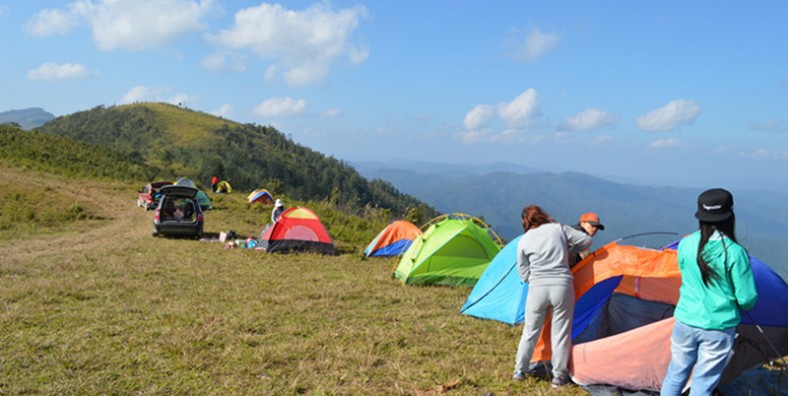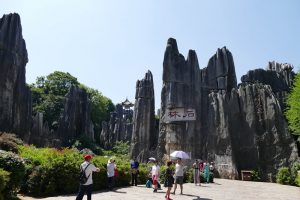Kongming Tea Mountain in Mengla County, Xishuangbanna
Chinese Name: 勐腊孔明茶山
English Name: Kongming Tea Mountain in Mengla County, XishuangBanna
ADD:西双版纳州勐腊县
Kongming Mountain
Kongming Mountain in Xishuangbanna is located near the Gedeng ancient tea mountain and is the highest peak among the “Six Ancient Tea Mountains” of Pu’er tea. It is situated in the northeastern part of Xishuangbanna, approximately 64 kilometers from Jinghong, with a main peak elevation of 1,788.2 meters and an area of about 10 square kilometers. The mountain lies within Xiangming Yi Ethnic Township in Mengla County, consisting of thick layers of gray-black limestone from the Middle Triassic period. The mountain features a rugged karst landscape with multiple cliffs, with the steepest cliff facing north and connecting to the Xiaobai River (also known as Buyuan River; downstream it is referred to as Luosuo River). The southern slope meets the Guanyin Temple basin, where the ancient Guanyin Temple still stands.
The mountain boasts natural formations such as Ba Dao Men (Eight Gates) and Jiuqu Stone Steps, with bizarre rock formations and valuable plant resources like palm forests and cycad forests. The rocks on the mountain resemble various animals and mythical figures, with numerous unique stone formations. Elegant bamboo forests thrive, while ancient trees reach impressive heights, and intertwining vines create striking scenes of trees embracing stones and stones supported by trees.
Kongming Tea
Kongming Tea is a variety of Pu’er tea, primarily produced on Kongming Mountain in Mengla County at an altitude of 1,900 meters in the ancient tea region of Xishuangbanna. Here, several tea trees reach heights of up to 9 meters. According to legend, during the Three Kingdoms period, Zhuge Liang’s soldiers scattered tea seeds while marching south, leading to the creation of Kongming Tea.
Long-term consumption of Kongming Tea can enhance the immune system and effectively prevent and alleviate conditions such as high blood pressure, high cholesterol, dizziness, blurred vision, and constipation, all without side effects. It is considered a pure, natural health drink suitable for consumption throughout the year.
Historical Origin
According to legend, when Zhuge Liang led his troops south through Mengla County, many soldiers fell ill due to the miasma in the mountains. One day, Zhuge Liang dreamed of an elderly man who revealed a method of using tea to cure illnesses. He instructed his soldiers to chew tea leaves while marching, which miraculously cured them and boosted morale. After the campaign, Zhuge Liang sowed a large number of tea seeds in the mountains and taught the local people the art of brewing tea. In Yunnan’s ancient tea region, the names “Kongming Mountain” and “Kongming Tea” are revered. Each year, on the 23rd day of the 7th lunar month, locals hold the “Tea Ancestor Festival” to honor Zhuge Liang for bringing tea seeds, health, and advanced culture. To this day, local ethnic groups refer to the tea tree as “Kongming Tea” and the mountain as “Kongming Mountain,” showing great respect for Zhuge Liang as the “Tea Ancestor.”
Health Benefits
- Nutritional Components: Kongming Tea contains various vitamins and important physiological active compounds, such as anthraquinones.
- Amino Acids and Trace Elements: It is rich in essential amino acids and trace elements, which are vital for human nutrition and play a significant role in regulating physiological functions.
- Immune System Support: Regular consumption can enhance the immune system and effectively prevent and recover from conditions like hypertension, hyperlipidemia, dizziness, blurred vision, and constipation, without adverse effects.
- Quality Infusion: Kongming Tea has a bright color, good taste, and is resistant to multiple infusions, making it a high-quality health drink for all seasons.
Tea and Culture
The development of tea culture in Kongming integrates ancient philosophies of harmony between heaven, earth, and humanity, embodying virtues such as simplicity, frugality, and integrity. Kongming Tea represents this seamless connection between tea and culture, reflecting the essence of Chinese heritage.

 7 Days GolfingTour
7 Days GolfingTour
 8 Days Group Tour
8 Days Group Tour
 8 Days Yunnan Tour
8 Days Yunnan Tour
 7 Days Shangri La Hiking
7 Days Shangri La Hiking
 11 Days Yunnan Tour
11 Days Yunnan Tour
 6 Days Yuanyang Terraces
6 Days Yuanyang Terraces
 11 Days Yunnan Tour
11 Days Yunnan Tour
 8 Days South Yunnan
8 Days South Yunnan
 7 Days Tea Tour
7 Days Tea Tour
 8 Days Muslim Tour
8 Days Muslim Tour
 12 Days Self-Driving
12 Days Self-Driving
 4 Days Haba Climbing
4 Days Haba Climbing
 Tiger Leaping Gorge
Tiger Leaping Gorge
 Stone Forest
Stone Forest
 Yunnan-Tibet
Yunnan-Tibet
 Hani Rice Terraces
Hani Rice Terraces
 Kunming
Kunming
 Lijiang
Lijiang
 Shangri-la
Shangri-la
 Dali
Dali
 XishuangBanna
XishuangBanna
 Honghe
Honghe
 Kunming
Kunming
 Lijiang
Lijiang
 Shangri-la
Shangri-la
 Yuanyang Rice Terraces
Yuanyang Rice Terraces
 Nujiang
Nujiang
 XishuangBanna
XishuangBanna
 Spring City Golf
Spring City Golf
 Snow Mountain Golf
Snow Mountain Golf
 Stone Mountain Golf
Stone Mountain Golf














